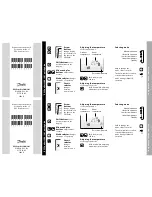
SE18M24
2
SW1 Operational direction of the valve
On: The valve is closed when the stem is in its lowest position.
Off: The valve is closed when the stem is in its highest position.
SW2 Flow characteristics
On: Gives linear flow characteristics in combination with equal
percentage valves. The actuator moves logarithmically in relation
to the control signal.
Off: Unchanged valve characteristics. The actuator moves linearly in
relation to the control signal.
SW3 Control signal
On: 2...10 V DC
Off: 0...10 V DC
The actuator can also be connected to a 4...20 mA control signal.
In this case, a 500 Ohm resistor should be installed between the
control signal input (terminal 3) and system neutral (terminal 2)
and SW3 should be set to position On (2...10 V DC).
The control signal will then be converted to 2...10 V DC.
SW4 Reverse/Direct operation
On: Reverse operation. The actuator closes the valve on increasing
control signal.
Off: Direct operation. The actuator opens the valve on increasing
control signal.
SW5 Split function
On: Split function. Two actuators can share a control signal and work
in sequence.
Off: No split function.
SW6 Working range when using split function
On: 5…10 V= 0…100 % (6…10 V when SW3=On)
Off: 0…5 V= 0…100 % (2…6 V when SW3=On)
LEDs
The actuator has two LEDs with indications according to the table
below.
Indication
Green steady light
Actuator working properly
Green light quick flashing
Test run in progress
Green light slow flashing
The setting was changed during the
operation. The new setting will be
valid after the next power on.
Red and green steady light
Endpoint reached
Red light slow flashing
Override operating mode
Red steady light
Operation faulty, either the improper
installation or the valve stroke lost
Endpoint markers
There is a red and a blue plastic endpoint marker on the actuator linkage.
The markers can easily be moved in order to show when the actuator is
closed/open for heating/cooling.
For heating valves, the red marker should be in the completely open valve
position and the blue marker in the completely closed valve position.
For cooling valves, the blue marker should be in the completely open
valve position and the red marker in the completely closed valve position.
EMC emissions & immunity standards
This product conforms to the requirements of the EMC Directive
2004/108/EC through product standards EN 60730-1:2000 and
EN 60730-2-14:1997.
RoHS
This product conforms with the Directive 2011/65/EU of the European
Parliament and of the Council.
Contact
AB Industrietechnik Srl
Via Julius Durst, 70 - 39042 Bressanone (BZ) - Italy
Tel. +39 0472/830626 - Fax +39 0472/831840
www.industrietechnik.it - [email protected]
i
ISTRUZIONI
SE18M24
IT
Prima dell‘installazione e del cablaggio del prodotto,
leggere le presenti istruzioni.
Attuatore valvola per controllo 0(2)…10 V
SE18M24 è un attuatore adatto al controllo di valvole AB
Industrietechnik. E’ dotato della funzione di adattamento automatico
della corsa e può essere azionato manualmente.
Caratteristiche tecniche
Tensione di alimentazione
24 V AC ±15 %, 50/60 Hz
o 24 V DC ±15 %
Segnale di comando
0(2)…10 V DC
Potenza massima assorbita
8.6 W / 22.4 VA
Corsa
10…52 mm
Tempo di corsa
1,5 s/mm
Forza
1800 N
Temperatura ambiente
0…50 °C
Temperatura di stoccaggio
-40…80 °C
Umidità ambiente
10…90 % UR
Dimensioni
198 x 309 x 133 mm
Grado di protezione
IP54
Installazione
Montare sulla valvola l’adattatore per lo stelo e l’adattatore per il
fissaggio valvola, se non sono già montati. Estrarre lo stelo della
valvola il più possibile. Rimuovere la chiusura a morsetto e le viti
(chiave esagonale da 6 mm) dalla staffa dell’attuatore. Premere
la linguetta a molla sul dispositivo a ghigliottina e inserire lo stelo
della valvola. Se necessario, muovere manualmente (vedi azio-
namento manuale) il perno dell’attuatore in modo che i fori per le
viti dell’attacco a morsetto siano allineati alla scanalatura presente
sull’adattatore valvola).
Per far estendere verso l’esterno il perno dell’attuatore, premere il
centro del pulsante manuale ruotandolo poi in senso orario e in senso
antiorario per ritrarlo Quando la valvola è posizionata correttamente,
rimontare il morsetto, inserire le viti e i dadi e serrare fino a quando la
valvola non è fissata saldamente.
Per il disassemblaggio eseguire la procedura in ordine inverso.

























